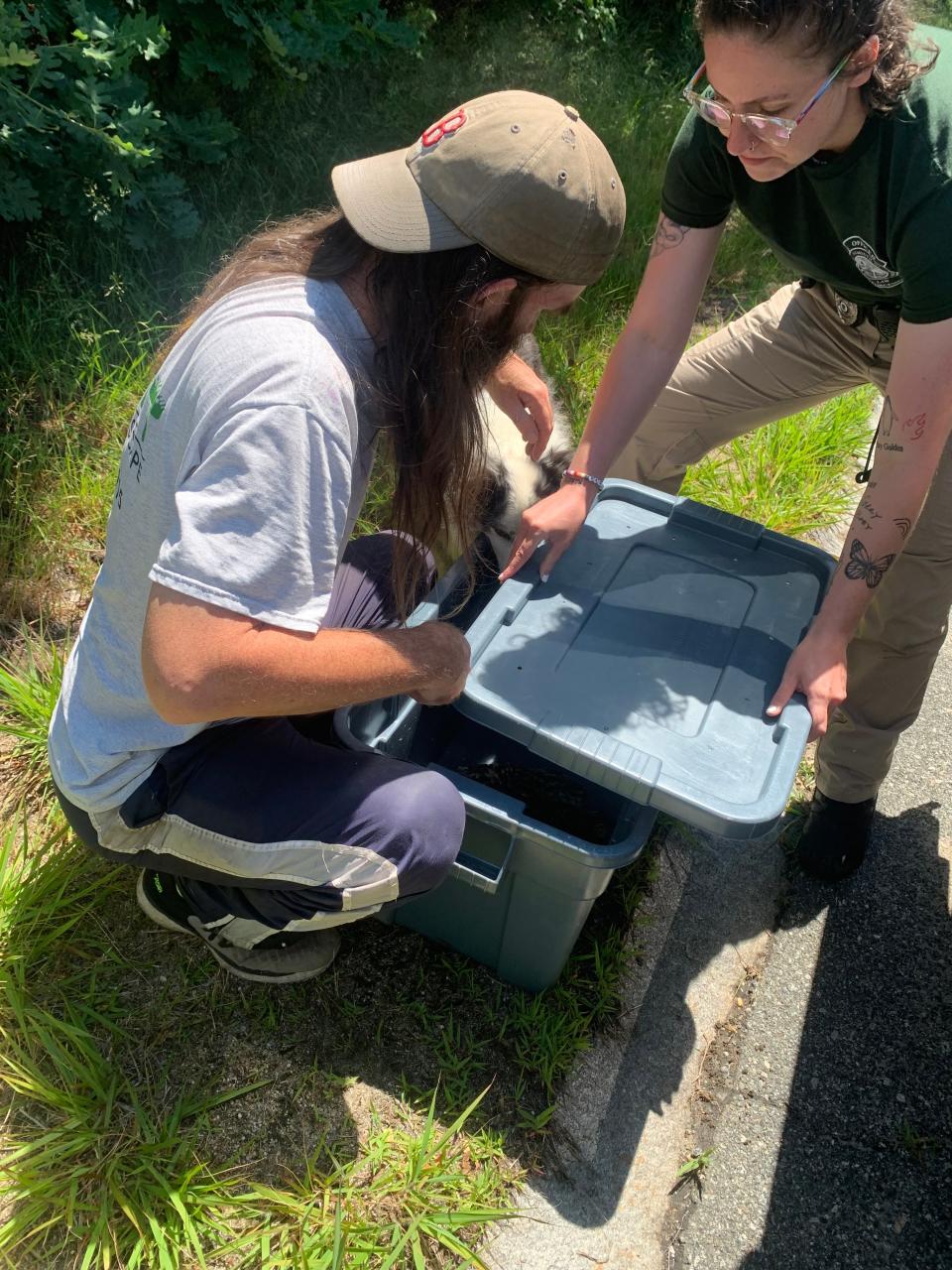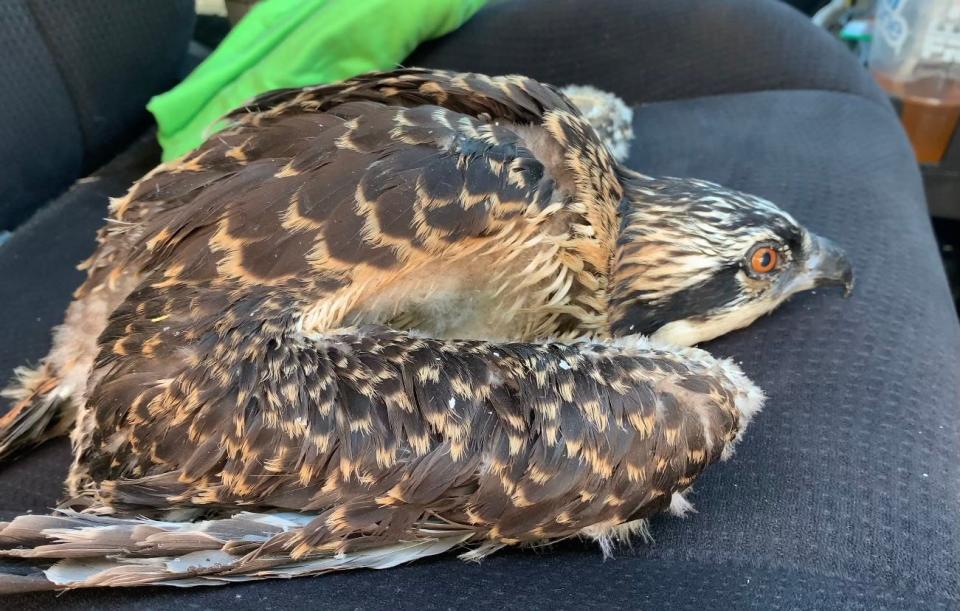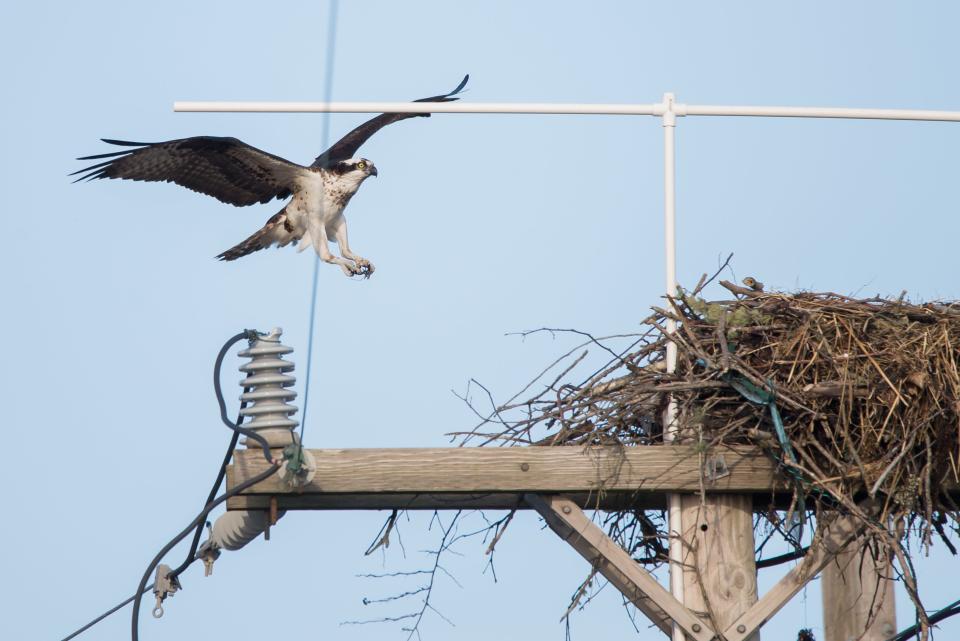Electrical pole fire in Falmouth destroys osprey nest, kills chicks
FALMOUTH— A fire on a Falmouth electrical pole housing an osprey nest left two chicks dead and many residents briefly without power on Monday.
Just after 10 p.m. on June 27, Eversource crews responded to an outage which knocked out service to approximately 525 customers on Thomas B. Landers Road, Eversource spokesman Chris McKinnon said in an email.
Crews found an osprey nest had come into contact with Eversource equipment and caused the fire. Eversource used remote switching to restore power to all but five customers within a half-hour, according to McKinnon.
Osprey safety on the Cape has been important to Eversource.
Related: Volunteers erect poles meant to provide safer nesting for osprey in Falmouth
"Over the past year, we have worked diligently with our community partners to best protect the safety and reliability of the electric system and the osprey population as it grows," McKinnon said in an email. "Part of that work involves installing deterrents on utility poles that have been identified by town officials, including this stretch of Thomas B. Landers Road where only three poles remain without a deterrent."
Kevin Friel, co-founder of the Osprey Project Falmouth, an organization that provides alternate perches for nesting ospreys, said he received a Facebook message alerting him to the fire late Monday evening.
Friel had a hunch which pole was on fire before even getting to the scene— a particular pair of ospreys the project keeps track of have nested atop electrical poles on that road for years.

When he arrived, he said his suspicious were confirmed. . The nest of the two ospreys he had in mind was on fire, making this the third year in a row this pair of ospreys' nests have been destroyed in that way.
When Friel returned the next day, he found a shocking scene.
"One baby chick was on the road burnt to a crisp, and the other one was just left there by the utility company," he said. "There were several other birds burnt too who had nested below the osprey nest."
Friel brought the surviving chick to the Cape Wildlife Center in Barnstable. It had suffered multiple fractures, he said, and had to be euthanized on Tuesday.

This situation is all too common, he said.
In Friel's estimation, 10 or 11 ospreys and one great-horned owl have died in electrical pole fires identical to Monday's over the past year.
"It's usually this time of year this happens," he said. "This time of year chicks can't fly yet, so when fires happen, there's nowhere for them to go."
Monday's rainy weather contributed to the fire as well, he said.
According to Exacter Inc., an electrical grid analytics platform, moisture from rain simultaneously makes the wood of the electrical poles less resistant to electrical currents, and wires more electrically conductive.
Piping Plovers: West Dennis Beach piping plovers will have their own watchdog amid concerns
"It's an awful situation," Friel said.
The Osprey Project has spent $30,000 on alternate nesting platforms throughout Falmouth to help protect ospreys and other birds.
Over the past winter, the organization managed to move 17 pairs of ospreys to these safer alternate platforms.
Keeping up with the ospreys: Nest cam offers bird's-eye view in Falmouth
Unfortunately, ospreys love to build their nests atop electrical poles. In order for alternate platforms to work, it's up to Eversource to provide effective deterrents on the poles to prevent nest building, Friel said.
Eversource has implemented successful deterrents on some electrical poles in town, but it's just not enough, he said.
What are nest deterrents?
The deterrents Eversource usually opts for are raptor guards, which are shaped like the letter "X" and made of metal, or T-bars, which are T-shaped PVC pipes mounted vertically on the poles, Friel said.
Photo gallery:: Return of the Kalmus Beach ospreys
These deterrents simply don't work, he said. Ospreys build their nests in the center of the raptor guards, and in order for the T-bars to be effective, they have to be placed at a specific height, which they rarely are installed at.
Black barrel deterrents, which use large barrel-type piping often found on playgrounds, are far more effective than raptor guards or T-bar deterrents, according to Friel.

Eversource has installed a handful of the black barrel deterrents on poles throughout town, even on an electrical pole on Thomas B. Landers Road, but the company has told Friel in the past it won't make such devices its default choice citing costs or lack of resources, despite a community member gifting the Osprey Project 150 feet of the piping.
"It's frustrating on my end because there is a very simple solution," he said. "I don't know what is preventing them from doing this."
Eversource takes steps to protect ospreys
Friel commended Eversource for the steps it has taken to protect ospreys, such as hiring a biologist to collaborate on policy and setting up an osprey nest tip email, but he like to see the company go further.
Photo gallery: Ospreys rebuild damaged nest
In Friel's eyes, Eversource removes reported osprey nests from its poles, but ineffective deterrents lead the birds to rebuild their nests in dangerous spots, trapping the nesting birds in a vicious cycle.
This article originally appeared on Cape Cod Times: Osprey chicks killed, power knocked when pole catches fire in Falmouth

